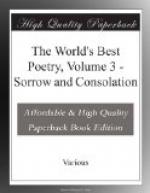But though the storms her course have altered,
Surely the port she’ll win;
Never my faith in my ship has faltered,
I know she is coming in.
For through the restless ways of her roaming,
Through the mad rush of the wild waves foaming,
Through the white crest of the billows combing,
My ship is coming in.
Breasting the tides where the gulls are flying,
Swiftly she’s coming in;
Shallows and deeps and rocks defying,
Bravely she’s coming in;
Precious the love she will bring to bless me,
Snowy the arms she will bring to caress me,
In the proud purple of kings she will dress me.
My ship that is coming in.
White in the sunshine her sails will be gleaming,
See, where my ship comes in;
At mast-head and peak her colors streaming,
Proudly she’s sailing in;
Love, hope, and joy on her decks are cheering.
Music will welcome her glad appearing.
And my heart will sing at her stately nearing,
When my ship comes in.
ROBERT JONES BURDETTE.
NEVER DESPAIR.[6]
Never despair! Let the feeble in spirit
Bow like the willow that stoops to the
blast.
Droop not in peril! ’T is manhood’s
true merit
Nobly to struggle and hope to the last.
When by the sunshine of fortune forsaken
Faint sinks the heart of the feeble with
fear,
Stand like the oak of the forest—unshaken,
Never despair—Boys—oh!
never despair.
Never despair! Though adversity rages,
Fiercely and fell as the surge on the
shore,
Firm as the rock of the ocean for ages,
Stem the rude torrent till danger is o’er.
Fate with its whirlwind our joys may all sever,
True to ourselves, we have nothing to
fear.
Be this our hope and our anchor for ever—
Never despair—Boys—oh!
never despair.
WILLIAM SMITH O’BRIEN.
[6] These lines were sent to me by William Smith O’Brien, the evening of Monday, October 8, 1848, the day on which sentence of death was passed upon him.
THOMAS FRANCIS MEAGHER. October 12, 1848.
THE SADDEST FATE.
To touch a broken lute,
To strike a jangled string,
To strive with tones forever mute
The dear old tunes to sing—
What sadder fate could any heart befall?
Alas! dear child, never to sing at all.
To sigh for pleasures flown.
To weep for withered flowers,
To count the blessings we have known,
Lost with the vanished hours—
What sadder fate could any heart befall?
Alas! dear child, ne’er to have known them
all.
To dream of love and rest,
To know the dream has past,
To bear within an aching breast
Only a void at last—
What sadder fate could any heart befall?
Alas! dear child, ne’er to have loved at
all.




